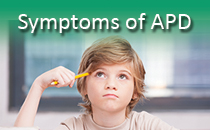In elementary school, children with Auditory Processing Disorder often have greater difficulty with spelling, reading, and comprehending information. Some children make it through the preschool years without their listening difficulties being noticed, relying on visual cues, body language, anticipation, and context clues to compensate. By the time they enter first grade, the struggle with learning to read and growing frustration may lead to a diagnosis of auditory processing disorder. However, when faced with learning and attention challenges, parents and educators often explore the possibility of dyslexia or ADHD since these are more familiar conditions due to the relatively low awareness of auditory processing disorder. Alternatively, some children, though they may appear slow to catch on, go unnoticed until third grade by memorizing words and observing other students for cues when instructions are unclear. In middle school, signs of auditory processing disorder may become more apparent as challenges intensify with increased listening demands. This transition results in difficulties following more complex or multi-step directions in noisy environments, adjusting to fast-paced classroom discussions, and meeting expectations for comprehending and retaining information from lectures and written texts, especially as picture cues are phased out from textbooks.
While some gifted students may have Auditory Processing Disorder (APD), their ability to function at grade level often masks any perceived problems or special needs. Despite outward appearances of functioning reasonably well, they are often performing well below their potential.
Identifying an auditory processing deficit can help to distinguish a learning disability from other causes of underachievement and help prevent the development of the accompanying social and behavioral problems that can result when it is overlooked.
However, it is crucial to acknowledge the variability of auditory processing disorder symptoms among children, recognizing that not all learning, language, and communication difficulties are caused by auditory processing disorder. The diagnosis of APD involves more than checking off items on a checklist because it frequently shares characteristics with other disorders or delays. If your child exhibits some of these symptoms, considering an APD evaluation is beneficial. Getting the right intervention is essential to placing your child on the path to reaching their full potential.
Symptoms of APD in Elementary School Children
- Act as if a hearing loss is present, despite passing hearing screenings
- Frequently ask ”huh?” or “what?” and often need information repeated
- Seem easily distracted or bored when conversations or activities do not include visuals
- Difficulty understanding spoken information presented in class
- Difficulty listening and following directions, especially multi-step directions in noisy environments
- Greater difficulty with verbal than nonverbal tasks
- Exhibit a language delay (weak vocabulary and poor sentence structure)
- Misinterpretation of questions
- Difficulty understanding announcements over loudspeakers
- Have articulation errors that persist longer than they should
- Tend to be distractible, especially when background noise is present
- Difficulty following classroom discussions, or making off-topic contributions
- Difficulty carrying on telephone conversations
- Have poor social communication skills or difficulty making and/or keeping friends
- Inability to sing in tune and poor musical ability
- Difficulty understanding riddles and jokes
- Misinterpret sarcasm or tone of voices and get feelings hurt easily
- Become frustrated with certain tasks. (i.e. saying “I don’t understand,” I can’t do this,” or “I don’t know what you mean” )
- Poor reading comprehension
- Trouble sounding out new words and poor fluency when reading aloud
- Poor spelling skills
- Confusion or reversal of letters
- Difficulty remembering people’s names
- Display poor memory for words and numbers
- Difficulty with complex language such as word problems
- Seeming to ignore others when engrossed in a non-speaking activity
- Difficulty understanding people who speak quickly
- Difficulty finding the right words to use when talking
- Slow or delayed responses to verbal instructions
You can now complete the Auditory Processing Domain Questionnaire (APDQ) screening tool online free of charge. Designed for students aged 7 to 17 facing listening and learning challenges, this 50-item questionnaire can be easily completed by parents or professionals to identify a child’s risk profile for Hearing-Auditory Processing, Attention, and Language-Learning disorders. Upon completion, a report is instantly generated, detailing the likelihood of listening, attention, or language deficits. Gain valuable recommendations for case-appropriate professional follow-up. Access the screening tool here.





